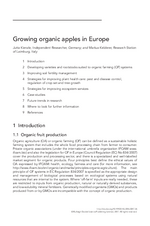J. Kienzle, Independent Researcer, M. Kelderer, Laimburg Research Centre, “Growing organic apples in Europe”, in K. Evans (edt)., Washington State University, “Achieving sustainable cultivation of apples” (2017). ISBN-13: 9781786760326
J. Kienzle, Independent Researcer, M. Kelderer, Laimburg Research Centre, “Growing organic apples in Europe”, in K. Evans (edt)., Washington State University, “Achieving sustainable cultivation of apples” (2017). ISBN-13: 9781786760326Focus and some key challenges in research on Organic Farming (OF):
- Development of varieties and rootstocks suited to OF: varieties should hold low susceptibility towards the most important diseases, pests and abiotic damages (frost, sunburn…). Fruits should be tasty, salubrious, low in allergens, with a good shelf-life and storage stability. Breeding techniques based on genetic modification are not accepted in OF. However, for a truly resilient sustainable system, it will be indispensable to broaden the genetic basis of the tolerance to pathogens. Problem with resistant varieties: other diseases become prominent, resistance breakdown.
- Improving soil fertility management: in OF natural resources internal to the system are applied and off-farm inputs are minimized. Next to the yield, evaluation of the effect of fertilization should consider the fruit quality and the shelf-life. Also, organic fertilizers are needed in OF that have a nutrient composition close to the needs of the fruit trees.
- Strategies for plant health care: Biodiversity is combined with the direct input of plant protection products (natural or naturally derived substances).
Weed control: A spread practice: Combination strategies of tillage in spring followed by a light cover of the tree row with the cut vegetation, combined with a new machinery that removes weed by brushing. A green manure period before planting is advised.
Disease control: indirect methods: less susceptible varieties; for apple scab: reduction of ascospore concentration. Direct methods: copper, sulphur, lime sulphur, carbonates. 4 pillars to reduce copper: less susceptible varieties, reduce infestation potential, forecasting models for precise timing of applications, new products, rain covers. For storage diseases: hot water treatments.
Pest control: functional biodiversity. Gap: little knowledge about occurrence and biology of many natural predators. The rosy apple aphid requires direct control measures. Direct control of apple sawfly is managed with Quassia amara extracts. Codling moth is controlled through mating disruption and several measures (mainly C. pomonella gronulosis virus). The population of diapausing larvae can be reduced with entomophagous nematodes in autumn. The codling moth population is also reduced with netting. New exotic pests can appear any time.
Thinning: rope thinners are tested and the application of transpiration inhibitors.
- Ecosystem services: Calculation systems that allow a fast check of the effect of intended changes in the production system on carbon footprint and energy consumption would be important!
Publications
| “Achieving sustainable cultivation of apples” (2017). ISBN-13: 9781786760326 | J. Kienzle, Independent Researcer, M. Kelderer, Laimburg Research Centre, “Growing organic apples in Europe”, in K. Evans (edt)., Washington State University, “Achieving sustainable cultivation of apples” (2017). ISBN-13: 9781786760326 Published: 16-08-2018 |
Documents
|
|
Burleigh Dodds () Achieving sustainable cultivation of apples Editor Dr Kate Evans is Professor of Horticulture at the Tree Fruit Research and Extension Center at Washington State University, USA. Dimensions: 229x152mm 6x9" Publication date: 16 June 2017 Length of book: 616 pages Burleigh Dodds Science Publishing Limited 82 High Street Sawston Cambridge CB22 3HJ UK |

|
Growing organic apples in Europe () J. Kienzle, Independent Researcer, M. Kelderer, Laimburg Research Centre, “Growing organic apples in Europe”, in K. Evans (edt)., Washington State University, “Achieving sustainable cultivation of apples” (2017). ISBN-13: 9781786760326 |
Links
|
Achieving sustainable cultivation of apples |
Details
- Activity type
- Publication of book/booklet/chapter
- Activity work package
- Reduction in pesticide residues
- Activity number
- Laimburg - WP3 - A83
- Activity contact
- Dr. Markus Kelderer
Laimburg Research Centre
Laimburg 6 - Pfatten
I-39040 Post Auer (BZ), Italy
[email protected] - Activity partner
- Laimburg Research Centre
- Activity country
- Italy
- Last edit
- 08-08-2018

The EUFRUIT thematic network has received funding from the
European Union's Horizon 2020 research and innovation programme
under grant agreement No 696337.
European Union's Horizon 2020 research and innovation programme
under grant agreement No 696337.